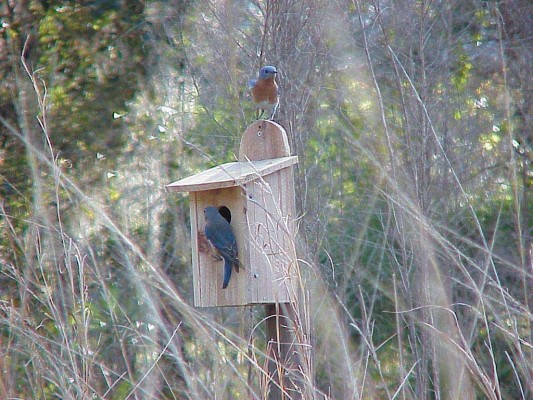and bring home the beauty of real Florida.
Visit FloridaNativeNurseries.org
 Beloved symbols of the American countryside, Eastern Bluebirds can still be found in some of Florida’s more rural areas. This colorful bird needs wide open spaces filled with native grasses, wildflowers, fruiting shrubs, and Longleaf Pine trees—including standing dead pines that provide nesting holes. (Here, a nestbox supplements lost habitat). In addition to insects, Bluebirds eat the berries of a variety of native shrubs. Photo by Sharon LaPlante.
Beloved symbols of the American countryside, Eastern Bluebirds can still be found in some of Florida’s more rural areas. This colorful bird needs wide open spaces filled with native grasses, wildflowers, fruiting shrubs, and Longleaf Pine trees—including standing dead pines that provide nesting holes. (Here, a nestbox supplements lost habitat). In addition to insects, Bluebirds eat the berries of a variety of native shrubs. Photo by Sharon LaPlante.By incorporating bird-friendly Florida native plants in your landscape, you and your family can enjoy birdwatching at home, all year long. Think how proud and thrilled you’ll be when birds build their nests in your yard and teach their hatchlings how to fly, right outside your window!
You’ll learn to recognize seasonal changes by the arrival and departure of migrating birds as well as the breeding and nesting habits of year-round residents. Observe your existing landscape and the surrounding area. Check field guides and consult with your local chapter of the Audubon Society to find out what kinds of birds occur in your area. Even in a very urbanized area, you’ll see Mockingbirds, Cardinals, Blue Jays, Doves, Woodpeckers, Grackles, Pigeons, and others. If there are woods nearby or many large trees, you may see more kinds of birds. Study the habits of birds you see and learn more about them—where they nest and what they eat—to guide your landscape plans. Identify the plants you already have and remove invasive non-native plants, even if (especially if!) they are used as food by birds.
It is not necessary to use birdseed to attract birds! The best way to attract birds is by planting a wide variety of native plants that provide food, shelter, and nesting resources. Variety is important so that food will be available year round and in different forms (flowers, fruits, and seeds). Small birds will eat smaller fruits and seeds than larger birds. Different birds like to forage, rest, and nest at different heights, so trees and shrubs of varying sizes are desirable, as well as groundcover for birds that nest and feed on the ground. Dense foliage and many branches are needed for hiding and nesting, so consider planting a thicket with shrubs like Walter’s Viburnum, Florida Privet, and Saw Palmetto. And if you have dead or dying trees, leave them standing whenever possible. Woodpeckers, Bluebirds, Chickadees, Nuthatches, Screech Owls and others nest in cavities of dead trees. Be sure to include water in your landscape plan—a simple birdbath will serve many birds.
Many birds eat insects, especially during nesting season. Most garden insects are beneficial and not a cause for concern. Never use pesticides or you’ll endanger the health of your family and the birds, as well as destroying a primary source of bird food. Insects are attracted to decaying vegetation as well as flowering plants, so don’t obsess over neatness in your garden. Brush piles, leaf litter, spent flowers—these are all important for insects, and thus for birds.
Keep your cat indoors! Predation by roaming household cats is a leading cause of the decline in songbird populations.